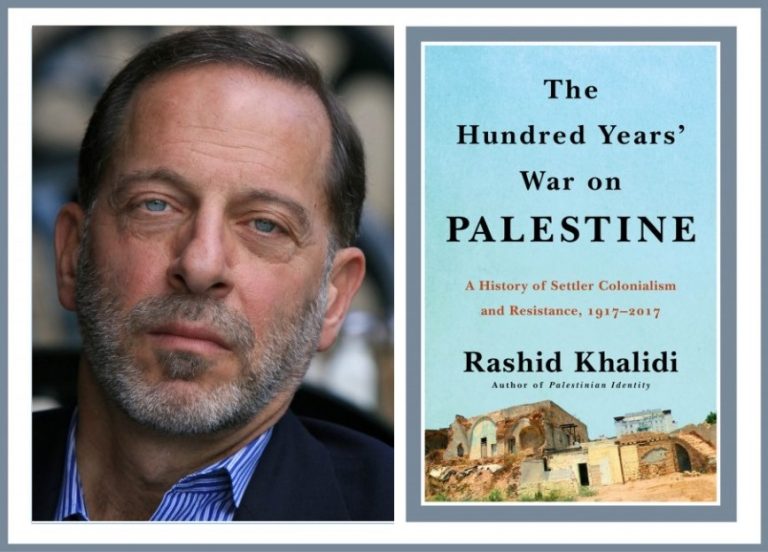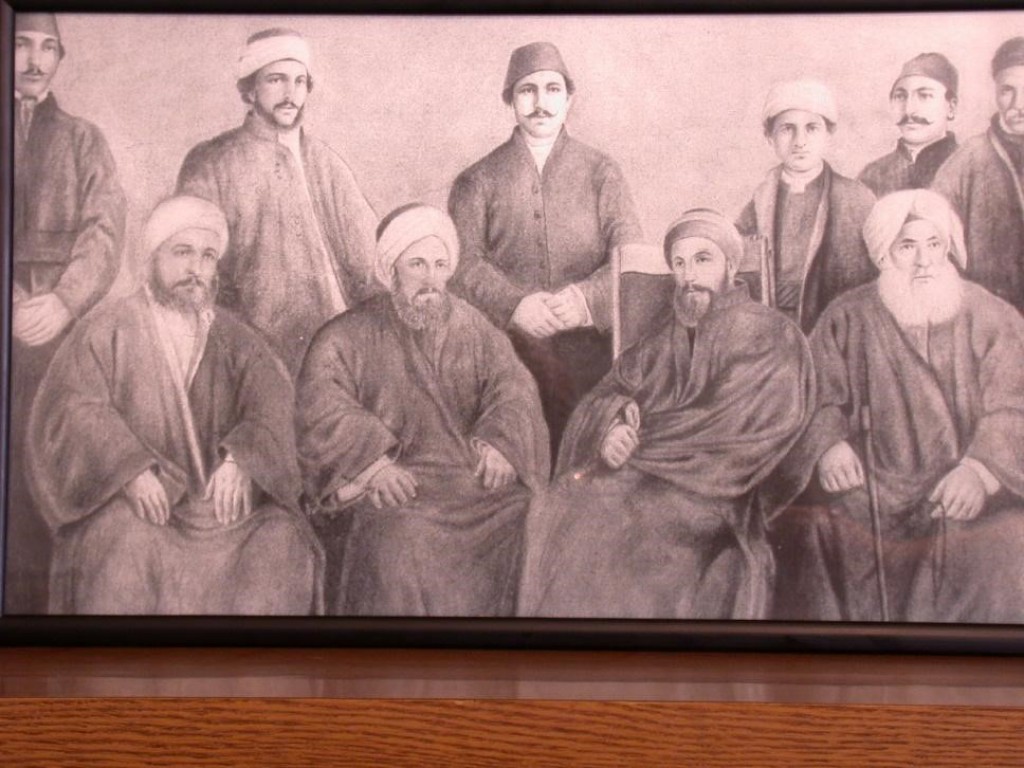Pathbreakers of Arab America: Rashid Khalidi

By: John Mason / Arab America Contributing Writer
This is the seventeenth in Arab America’s series on American pathbreakers of Arab descent. The series includes personalities from entertainment, business, sports, science, academia, journalism, and politics, among other areas. Highlighted is our seventeenth pathbreaker, Rashid Khalidi, Palestinian-American and leading historian and analyst of the Middle East. Born in New York City, he is the son of Ismail Khalidi, a Saudi citizen of Palestinian birth in Jerusalem, and his Lebanese-American mother. Khalidi is passionate about Palestine, where his distinguished family has deep roots in Jerusalem from Ottoman and British periods of rule. In this renewed time of war in the Middle East, Khalidi’s analyses are all the more relevant and important.
Rashid Khalidi, prolific historian of nationalism and colonialism in Palestine and the Middle East—and exquisite academic
Rashid Ismail Khalidi (رشيد خالدي) was born in 1948 and spent his early years in New York City, where his father was a diplomat at the United Nations. He is a graduate of Yale and Oxford and taught at the University of Chicago, Georgetown, American University of Beirut, and Columbia, where he has been a fixture for decades. There, Khalidi is the Edward Said Professor of Modern Arab Studies. His writing and editing is prolific, having been editor of the Journal of Palestine Studies, and author of books, including The Hundred Years’ War on Palestine and Palestinian Identity: The Construction of Modern National Consciousness. He served as president of the Middle East Studies Association.
Khalidi’s work has gone beyond academic matters to involvement in politics. When he taught in Beirut, he became involved in politics, namely in support of the broad Palestinian initiative, through news services and affiliation with the Palestinian Liberation Organization. On returning to the U.S., his commentaries became more proactive regarding such events as the Gulf War, and membership on such committees as the National Advisory Committee of the U.S. Interreligious Committee for Peace in the Middle East. This organization includes Jews, Christians and Muslims “dedicated to dialogue, education and advocacy for peace based on the deepest teachings of the three religious traditions.”

Khalidi is prominent in various Palestinian publications efforts. He is a member of the Board of Sponsors of The Palestine–Israel Journal, a founding trustee of The Center for Palestine Research and Studies, and a member of the Council on Foreign Relations. Khalidi’s research focuses on how national identities emerge and the part played by external powers in their development. He is also interested in how journalism impacts identity and community, the impact of the press on forming new senses of community, and how education can be used to construct political identity.
An important contribution Khalidi has made to modern Middle East history is his contention that the emergence of Palestinian nationalism dates to the early 20th century, not simply to the moment of Israel’s creation in 1948. His work, according to Wikipedia, “provides a rejoinder to Israeli nationalist claims that Palestinians had no collective claims prior to the 1948 creation of Israel.” It is Khalidi’s aforementioned work, Palestinian Identity, which argues that “Arabs living in Palestine began to regard themselves as a distinct people decades before 1948, and that the struggle against Zionism does not by itself sufficiently explain Palestinian nationalism”.
Another contribution by Khalidi is his focus on how colonialism has failed the Palestinian nationalist movement. His book, Resurrecting Empire: Western Footprints and America’s Perilous Path in the Middle East (2004), depicts how the West has disfavored Palestinian self-development. It includes the U.S., which used its Cold War policies against the Soviets, which “consistently undermined democracy and exacerbated tensions in the Middle East.” Khalidi even avers that U.S. policy supported the emergence of “incarnations of radical, militant Islam, in order to use all possible resources in waging the Cold War.”

A fair-minded analyst, Khalidi on the role Palestinians have played in their failed bid for statehood
In the present period of renewed warfare between Israel and Gaza-based Hamas, the implications for Palestinians and their aspirations for statehood are as bleak as ever. This new war has occurred almost 50 years to the day as the October 6, 1973, Yom Kippur or Ashra Ramadan Arab attack on Israel. Khalidi’s earlier research and assessments of their chances of statehood are highly relevant today. His 2007 book, The Iron Cage, is an attempt to assess, according to a New York Times review, “why the Palestinians, unlike so many other peoples and tribes, have failed to achieve an independent state. To Mr. Khalidi’s credit, the answers are not very comforting to Palestinians, whose leaders have often made the wrong choices and have not yet built the institutional structures for statehood.”
Khalidi particularly contrasts Palestinian weak decision-making before 1948 with “the more organized behavior of the Jewish population of British Palestine.” He is concerned about why the Palestinians seemed to fold so quickly in 1948 when they owned almost 90% of the private land. Khalidi wonders how 750,000 out of 1.4 million Palestinians seemingly capitulated, fleeing their land in only a few months. He blames “British colonial masters like Lord Balfour, who refused to recognize the national rights of non-Jews; lavish financial support for Jewish immigration; the romanticism and cynicism of Arab leaders, themselves newly hatched from the colonial incubator.”

Khalidi also put some blame on the U.S., which “consistently privileged the interests of the country’s Jewish population over those of its Arab residents,” helping Israel to push “Palestinians into an impossible corner, into an iron cage” from which, he suggests, a viable Palestinian state may not, in the end, emerge.
Palestinians are not free of blame either, “for the rivalries among rich Palestinian families who competed to serve their colonial masters, for leaders who failed to see the impact of Hitler on Jewish immigration to Mandate Palestine, for those who mismanaged the 1936-39 Palestinian revolt against the British and especially for Yasir Arafat, who, along with his colleagues in Fatah and the Palestine Liberation Organization, has a special place in Mr. Khalidi’s pantheon of Palestinian failure.” This book was too early to include judgments of the role Mahmoud Abbas, current president of the Authority, has played.
In the end, as the Times review states, “his book represents a brave response to Palestinians who see themselves only as victims.” Time will now tell how Palestinians emerge from repeated cyclical wars and the long Israeli occupation, which, sadly, too many American governments have underpinned.
Sources:
–“Rashid Khalidi,” Wikipedia list of Arab Americans, 2023
–“Assessing the Role Palestinians Have Played in the Failed Bid for Statehood,”” New York Times, by Steven Erlanger, 10/07/2006
John Mason, Ph.D., who focuses on Arab culture, society, and history, is the author of LEFT-HANDED IN AN ISLAMIC WORLD: An Anthropologist’s Journey into the Middle East, New Academia Publishing, 2017. He has taught at the University of Libya, Benghazi, Rennselaer Polytechnic Institute in New York, and the American University in Cairo; John served with the United Nations in Tripoli, Libya, and consulted extensively on socioeconomic and political development for USAID and the World Bank in 65 countries.
The views and opinions expressed in this article are those of the author and do not necessarily reflect the position of Arab America.
Check out our Blog here!









